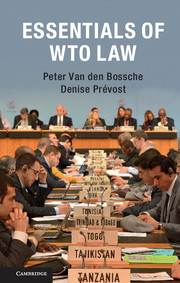Book contents
- Frontmatter
- Contents
- List of figures and tables
- Preface
- List of abbreviations
- Table of cases
- 1 International trade and the law of the WTO
- 2 Rules on non-discrimination
- 3 Rules on market access
- 4 Trade liberalization and other societal values and interests
- 5 Rules on unfair trade
- 6 Rules regarding harmonization of national regulation
- 7 The institutional aspects of the WTO
- 8 The WTO dispute settlement system
- Online resources
- Index
- References
8 - The WTO dispute settlement system
- Frontmatter
- Contents
- List of figures and tables
- Preface
- List of abbreviations
- Table of cases
- 1 International trade and the law of the WTO
- 2 Rules on non-discrimination
- 3 Rules on market access
- 4 Trade liberalization and other societal values and interests
- 5 Rules on unfair trade
- 6 Rules regarding harmonization of national regulation
- 7 The institutional aspects of the WTO
- 8 The WTO dispute settlement system
- Online resources
- Index
- References
Summary
Introduction
The WTO possesses a system for the settlement of disputes between its Members that is in many respects unique and quite successful. This system is provided for in the WTO Dispute Settlement Understanding (DSU). It creates a single, integrated system for the resolution of disputes arising under any of the WTO ‘covered agreements’.
The WTO dispute settlement system is the most prolific international State-to-State dispute settlement system. From the WTO's establishment in 1995 to date (i.e. 1 December 2015), 500 disputes have been brought to the WTO dispute settlement system, and 194 panel reports and 120 Appellate Body reports have been adopted. Although many of these disputes are of a technical nature, others are politically sensitive and have received extensive media attention.
Disputes that have received much attention from the media include those involving domestic health or environmental legislation: among others, EC – Approval and Marketing of Biotech Products (2006), a dispute on the European approval regime for biotech products; Brazil – Retreaded Tyres (2007), a dispute on Brazilian measures to reduce risks arising from the accumulation of waste tyres; EC – Hormones (1998), a dispute on the European ban on meat from cattle treated with growth hormones; US – Shrimp (1998), a dispute on the US ban on shrimp caught in nets that lead to incidental killing of sea turtles; US – Tuna II (Mexico) (2012), a dispute concerning US requirements for the use of its ‘dolphin-safe’ label on tinned tuna; US – Clove Cigarettes (2012), a dispute on the US ban on flavoured cigarettes, except menthol cigarettes; and the China – Raw Materials (2012) and China – Rare Earths (2014) disputes regarding China's export restrictions on natural resources essential in the production of high-technology products. In addition, the EC and Certain Member States – Large Civil Aircraft (2011) and US – Large Civil Aircraft (2012) disputes, dealing with many billions of euros and dollars of European and American subsidies to Airbus and Boeing, respectively, have been economically very significant and of high political sensitivity.
- Type
- Chapter
- Information
- Essentials of WTO Law , pp. 259 - 295Publisher: Cambridge University PressPrint publication year: 2016



